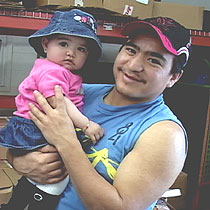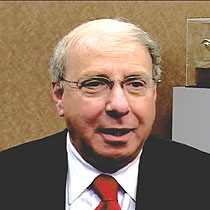2007年VOA标准英语-Citizens' Group Gets Food to Needy Residents(在线收听)
Washington
01 May 2007
To most Americans, the governments in their towns and regional areas called counties are the governments they interact with the most. And alongside these local governments are groups of citizens who work on their own to make life better.
In this segment of a multi-part series, VOA's Jeffrey Young highlights the efforts of a non-governmental group to provide food to needy residents in Montgomery County, Maryland.
Food. It is plentiful in the United States, but some people cannot afford to buy it. That is why Manna Food Center exists.
Montgomery County, Maryland, just outside Washington, D.C., has an affluent appearance with lots of big homes and expensive cars. But some people there do not share in that wealth. Many of these people have jobs and work long hours, yet their earnings cannot pay the high costs of living there. Sometimes, there is no food on their table.
 |
| Antonio Reyanna uses the food bank to help feed his family |
When people come to Manna Food Center, they get a box filled with fresh produce, bread, canned goods and meat.
Manna's Executive Director, Amy Gabala, says that box of food is a bridge between meager paychecks. "We serve 2,000 families every month. So what that means is that we're giving 2,000 families each month a three-to-five day supply of food. And this is food that enables them to tide themselves over when they run out of money at the end of the month," says Gabala.
And before people get free food, their needs are verified. Recipients are referred to Manna Food Center by social service agencies, community groups, churches and other sources.
The food Manna gives away comes from a number of grocery stores in Montgomery County and the rest of the Washington, D.C. area.
 |
| Barry Scher, Giant Food vice president |
But Manna has to go out to Giant and other stores and pick up this food. It starts early, as Manna's busy Operations Director, Donnell Foreman, explains. “Our drivers start at seven o'clock. They go out to 22 different grocery stores in the morning. They bring it back here at 11:30. That's when the groceries are packed, and we're getting ready for distribution at 12 o'clock."
The people get their free food from noon until 3 p.m. Those who come reflect Montgomery County's diversity. Some dress well enough to hide their poverty. But it is still there.
And sometimes that poverty can be the result of circumstances that keep people from earning a paycheck. That is Dennis Bocook's situation. "Well, I've been disabled and sick for a while, and my family has been disabled and they're sick. And my grandmother is getting old."
Dennis Bocook says this food bank means everything to his family. "If we didn't have Manna, we would be very hungry."
Montgomery County's government has assistance programs for the poor. But hunger is immediate -- and that is where local charity groups such as Manna step in and make a big difference in the community. Groups like Manna can be found across the United States. Because of them, there is more food on people's tables.